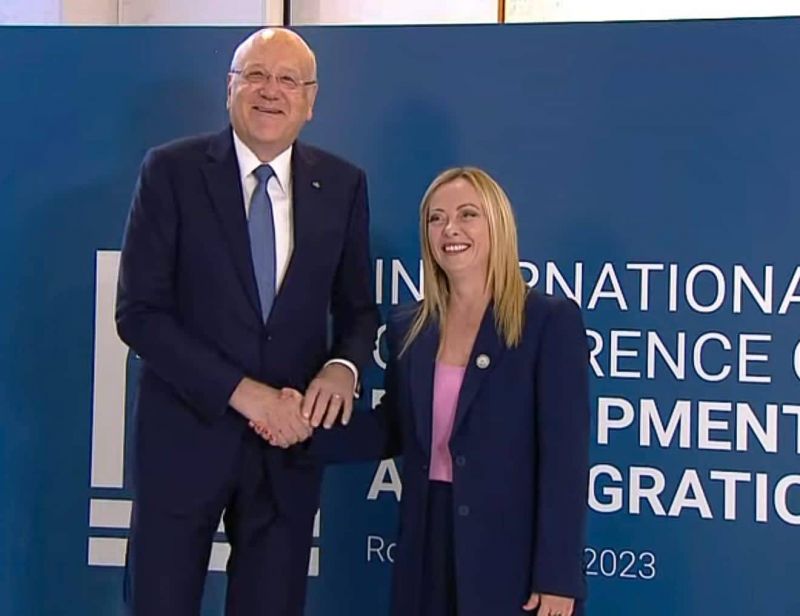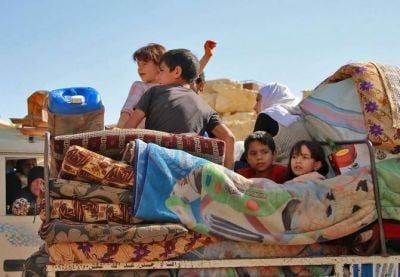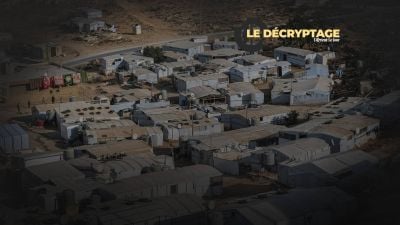
Lebanese caretaker Prime Minister Najib Mikati (l) shaking the hand of Italian Prime Minister Giorgia Meloni (r) at a conference in Rome, Italy on 23 July 2023. (Courtesy of Hoda Chedid/L'Orient Today)
BEIRUT — The international community should look to Lebanon as a "model in resolving the [irregular migration] crisis," caretaker Prime Minister Najib Mikati said Sunday at a conference in Rome to discuss migration across the Mediterranean.
“With very limited resources, and a severe lack of attractive job opportunities in the country, the Lebanese have welcomed the Syrian refugees with open arms, but it’s time for them to be repatriated to Syria,” Mikati said.
Italy’s far-right Prime Minister Giorgia Meloni welcomed leaders from around the Mediterranean to Rome on Sunday to promote international coordination on irregular migration.
“Our resources are very limited, if any, to contain the impact of this refugee crisis on the fabric of Lebanese society and infrastructure in general, and we have been hosting Syrian refugees since 2012,” Mikati said.
“Lebanon is ready to engage in constructive dialogue and cooperation with all international partners to develop a common road map to address this crisis, and we are keen to enhance our cooperation with the European Union in this endeavor."
Mikati asks for more funding for Lebanon
Mikati urged the international community to “allocate sufficient resources to fortify border control measures.”
“Our work in curbing migration also requires securing immediate global financial assistance for Lebanon, strengthening border security, combating criminal networks engaged in human trafficking, investing in capacity-building initiatives, and sharing best practices for managing refugees,” Mikati concluded.
Brussels and Rome signed a memorandum of understanding with the Tunisian president last week which provides for 105 million euros in European aid intended to prevent the departure of irregular migration boats and to fight against smugglers.
During the 2022 legislative campaign that brought her to power, Meloni had promised to "stop the landings" of migrants in Italy.
According to Rome, some 80,000 people have crossed the Mediterranean and arrived on the coasts of the peninsula since the beginning of the year, against 33,000 last year over the same period, mostly from the Tunisian coast.
‘The fight against illegal migration’
Meloni opened the conference by setting the priorities for what she calls "the Rome process, which is to fight against illegal immigration, management of legal immigration flows, and support for refugees.”
“The position of the Lebanese government on this issue [of migration] is now the following: Since the conflict in Syria is over, we need to put in place a plan for the safe and secure return of all refugees to their homeland. International organizations and donors, instead of financing their stay in Lebanon, should redirect these funds to be paid on conditions to individuals and families who decide to return to their homeland,” Mikati said in his speech.
However, human rights groups have repeatedly warned of the dangers and abuses faced by those who return to Syria, including detention and forced military conscription.
Mikati stated that the situation in Lebanon is particularly critical, after hosting one of the largest numbers of refugees per capita in the world.
He warned that if the international community does not step up to help Lebanon face the “Syrian refugee crisis, and help Lebanon emerge out of the crisis it’s in, it should prepare for a "lost generation" of Lebanese youth.
“Lebanon, a relatively small country of five million people, now bears the responsibility of absorbing nearly two million Syrian refugees. To put this into perspective, it would be as if Italy were receiving and hosting 20 million refugees!” Mikati said.
EU resolution
Earlier in July, the European Parliament passed a 16-point resolution dealing with various issues, including the political crisis and the Beirut blast. The 13th paragraph, which refers to the presence of Syrian refugees in the country, triggered controversy.
While Article 13 does not explicitly call for Syrian refugees to remain in Lebanon, it states that "the conditions required for a voluntary and dignified return of refugees are not present."
This reflects the position the international community has taken over the years. The text also calls on Lebanon "to refrain from expelling, imposing discriminatory measures and inciting hatred against Syrian refugees.
Mikati blasted this resolution in Rome and stated that “instead of acknowledging and motivating my country's resilience — and the vigilance of the Lebanese Armed Forces — in the face of the refugee crisis, we find ourselves being blamed, or rather punished for our hospitality and efforts.”
Amid increased deportations of Syrians from Lebanon in recent months, rights groups have decried dangerous conditions inside Syria.
Earlier this month, Human Rights Watch reported that Lebanon had arrested more than 2,000 Syrians and deported 1,800 since April amid increasingly aggressive policing of displaced Syrian communities in Lebanon and a rise in anti-Syrian refugee rhetoric.

